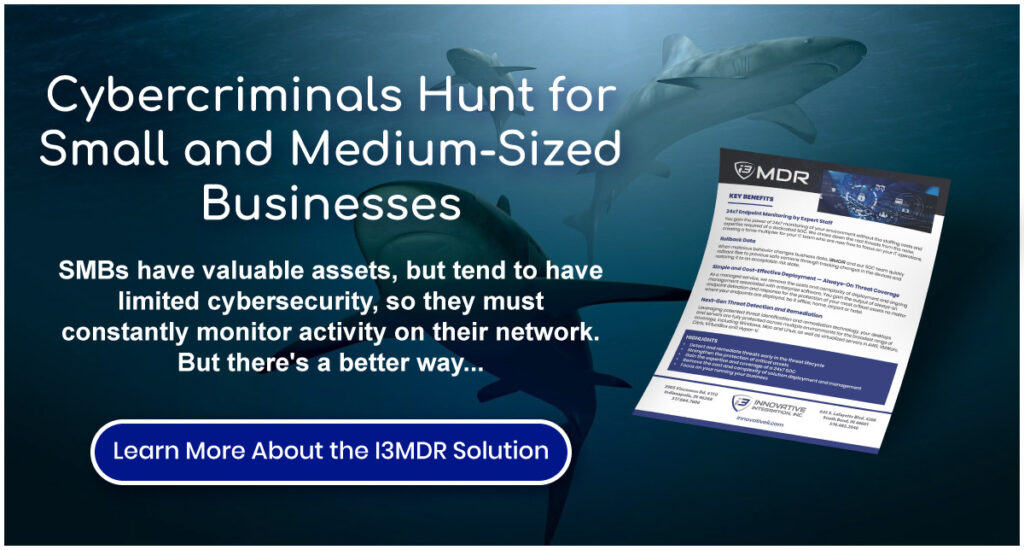Odds are that no matter what cybersecurity software you use for your business, your network is still at risk from spear phishing attacks. Spear phishing presents the greatest threat to data security due to how few employees separate false messages from genuine senders. So, to better prepare your company and your security infrastructure against cyberattacks, let’s discuss what spear phishing is and how to prevent these scams from penetrating your network.
Cybercrime is on the Rise! Click Here to See Cybersecurity Stats.
What is Spear Phishing?
Spear phishing is a malicious email or electronic communications scam meant to attack a specific individual, organization, or business. Like most email scams, spear phishing allows cybercriminals to to gain unauthorized access and steal sensitive information; however, unlike standard malware, the perpetrators of spear phishing attacks may be sponsored by competitors or foreign governments to steal financial, military, or trade secrets from a company.
How Spear Phishing Works
Spear phishing attacks appear as an email from a reliable source, such as a supervisor or co-worker within the company. Though both types of phishing can request codes, data or embed fraudulent links to install malware, what makes spear phishing successful is how hackers thoroughly personalize the emails to a certain target.
Cybercriminals craft each spear phishing email to personally appeal to the target by researching their social media, company profile, and direct contacts. Using these sources, hackers mimic the communication patterns of the target’s colleagues, thereby gaining access to company data under the clever guise of a legitimate person. As a result, even CEOs or high-ranking company executives are susceptible to spear phishing attacks.
One accidental click on a spear phishing link or attachment can create serious issues for any business, government, or nonprofit organization. As these attacks are hard to detect with traditional cybersecurity, hackers can easily and stealthily rob targets of sensitive information such as:
- Social Security numbers
- Bank accounts
- Credit cards
- Sensitive commercial information
- Stocks or stock prices
- Network security keys and passcodes
- Personal credentials
Often, spear phishing attacks allow hackers to hijack computers to steal employees’ personal information, too, resulting in financial and identity theft.
How to Prevent an Attack
Due to the clever, subtle nature of spear phishing attacks, few cybersecurity systems can detect such malicious types of emails until activated. Upon activation, though, malware is already installed on your network, exposing personal and professional information to cybercriminals.
To combat spear phishing, company employees need to be educated on what these threats look like, security measures to prevent infiltration, and which steps to take in order to avoid falling for imposter emails. Consider implementing the following steps to secure information to protect your entire company network:
Security Awareness Training: The best defense is a strong offense, and there is no greater fighting force than the loyal members of your organization. Therefore, providing continuous security training to your employees will not only ensure protection from spear phishing scams but better online practices throughout the business.
Limit Social Media Information: Spear phishing relies upon the information gathered from victims’ social media profiles. Limiting how much personal information is listed online will curb the frequency and quality of spear phishing emails, making them more obvious to employees.
Avoid Embedded Links: Most computer safety guidelines warn users against clicking on links from emails due to fear of malware installation; even so, spear phishing’s impersonation of legitimate contacts makes keeping this practice harder for workers who need to exchange information. Just as a precaution, then, it’s important to reconfirm with colleagues directly before clicking any link.
Integrate Multi-Factor Authentication: In cases where your organization’s cybersecurity becomes compromised, spear phishing can be deterred by authentication restrictions. By requiring passcodes from other devices, hackers only have partial access and are thus restricted from the network without the user’s authority.
Let Innovative Integration Protect Your Data
While any of these practices can help prevent spear phishing attacks, proper data protection for any business requires integrating advanced cybersecurity software. At Innovative Integration, we offer enhanced network security solutions to not only secure your company’s data against various types of phishing scams, but also help track suspicious email and network activity with our Zero Trust Security model. To learn more about our cybersecurity services, contact us at Innovative Integration today.





